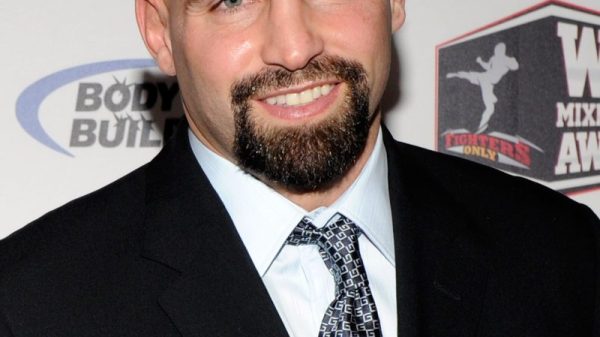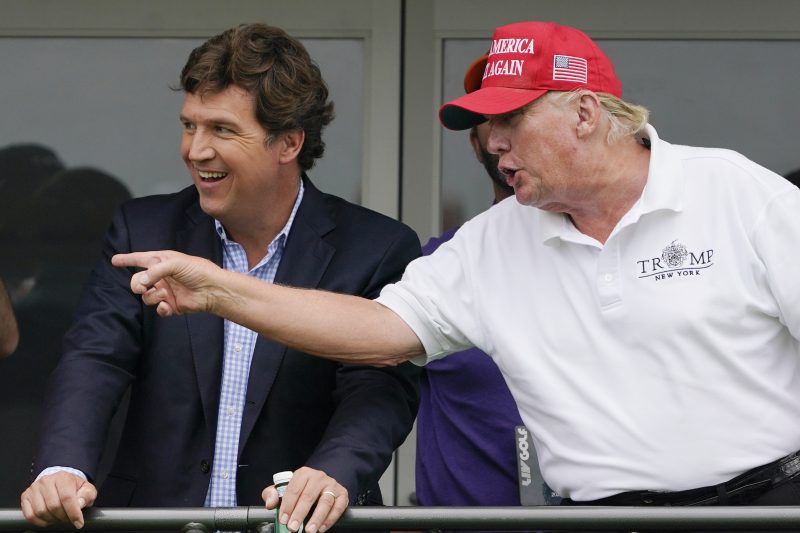One of the rare bright spots for Fox News’s coverage in the wake of the 2020 election was when host Tucker Carlson slammed the brakes — temporarily, at least — on one of the most obviously ridiculous claims percolating out of Donald Trump’s misinformation swamp.
“We invited Sidney Powell on the show,” Carlson told his audience on the evening of Nov. 19, 2020. “We would have given her the whole hour. But she never sent us any evidence, despite a lot of requests, polite requests. Not a page. When we kept pressing, she got angry and told us to stop contacting her.”
Powell, you will recall, was an attorney working with Trump’s legal team who offered truly bizarre allegations about rampant fraud committed through electronic voting machines. A few hours before Carlson’s show that night, Powell had joined former New York mayor Rudy Giuliani at a news conference in D.C. (the infamous hair-dye presser) where she first introduced to the public her theory that the 2020 presidential election had been tainted by some malfeasance involving dead dictators, international subterfuge and technological evildoing.
Carlson wanted Powell to come on the air and make her case. Since it was nonsense, she couldn’t. Carlson pointed out the lack of evidence, and, in short order, Trump and Giuliani distanced themselves from Powell.
Eventually, Powell’s willingness to say anything at all in service of helping Trump retain power helped her regain access to Trump’s inner circle. Newsmax’s willingness to do the same thing led Fox News to similarly host Powell again later in the month to try to stanch viewership losses. But, for that moment at least, Carlson and Fox News offered viewers an uncut taste of reality: Powell had no evidence for her claims and shouldn’t be taken seriously.
On Tuesday, one likely reason for Carlson’s skepticism became clear. His pushback on Powell came less than a week after he had aired false, easily debunked assertions passed to him by the Trump campaign — a report on Georgia voters that quickly blew up in his face. Carlson was forced to do something he almost never does despite his habit of regularly misleading his viewers: He offered a correction to his prior coverage.
In other words, it seems likely that Carlson’s public rejection of Powell was, in part, a function of having been burned by the Trump campaign a few days earlier.
Carlson was appearing on talk-radio host Bo Snerdley’s program this week when the host asked Carlson if he actually hates Trump. Carlson had written that he did in a text message that was released publicly early this month as part of Dominion Voting Systems’ $1.6 billion defamation case against Fox News.
“Those particular texts were pulled at exactly — at the moment where I was texting with one of my producers,” Carlson explained, “because some idiot on the Trump campaign had sent us the name of these dead voters who had voted. And we went, and I repeated them on air, and it turns out some of them were alive.”
What Carlson described to Snerdley is exactly what happened. On Nov. 11, Carlson claimed that several people who had cast ballots in the election in Georgia the week before were actually deceased, including a man named James Blalock.
“Mr. Blalock was a mailman for 33 years, until he passed away in 2006,” Carlson said. “Fourteen years later, according to state records, he was still mailing things. James Blalock cast a ballot in last week’s election.”
The claim that a deceased Blalock had voted was picked up by a number of right-wing politicians and Trump allies. And, in short order, a local television reporter revealed that, in fact, he hadn’t voted. It was his widow, who signed her ballot as Mrs. James Blalock.
President Trump’s campaign accused four Georgia voters of fraud. Said they voted ‘dead’ in the presidential election. We tracked two of them down, alive & well. We simply knocked on a door and 96-year-old Mrs. James Blalock answered. @11AliveNews https://t.co/n9dLA70jJB pic.twitter.com/10cbPJTXB0
— Brendan Keefe (@BrendanKeefe) November 13, 2020
This wasn’t the only one of the “dead” voters identified by Carlson who turned out to be alive. So, on Nov. 13, Carlson offered his on-air correction.
“We’ve got some good news tonight and an apology,” he said. “One of the people who voted in last week’s election isn’t dead. James Blalock is still dead. We told you about him, but it was his wife who voted. She voted as Mrs. James Blalock. It’s old-fashioned, and we missed it.”
“Of course we’re always going to correct when we’re wrong,” Carlson later added, which is itself not true.
Carlson explained to Snerdley that he “felt humiliated” after the on-air correction, which he offered as an example of why he was bashing Trump in text messages. (The message in which Carlson said he hated Trump “passionately” was not actually sent until early January.)
Notice the timing of the Georgia claims, though. It was less than a week after Carlson’s apology to his viewers that Powell and Giuliani held that news conference in which she offered up her most ridiculous claims. Carlson, feeling burned by Trump’s team, refused to once again accept its claims at face value when Powell showed up with her voting-machine allegations.
We may as well put a fine point on something here: Carlson should never have taken claims from Trump’s camp and aired them without validation in the first place. From a basic journalistic standpoint, this is obvious; taking explosive claims from interested actors at face value is not what the job entails, even for partisan actors like Carlson. But this was also coming from Trump’s allies, a group that, like Trump himself, had robustly demonstrated its lack of reliability as a source of objectively accurate information. It’s not just that Carlson took information and presented it as true without checking; it’s that he took that information from people understood to be willing to misinform if it was useful.
To Snerdley, Carlson blamed his mistake in Georgia on the campaign. “I was so mad by the incompetence of that campaign, which was completely incompetent,” he said. “I mean completely. You know, I’m like the one guy who’s open-minded about the election being unfair. And — and that’s what they send me?”
Yeah, man. That’s why you check information that you’re given before you include it in your television show.
But Carlson got his revenge. Perhaps he really did hope that Powell had the goods on voter fraud, prompting him to invite her on his show. Or perhaps, like any sentient person not under the spell of Trump’s false fraud claims, he recognized Powell’s claims as obvious nonsense. Perhaps he invited her on so that he might embarrass her and the Trump team by extension.
Perhaps, in other words, that infamous moment in which Fox News actually exposed false fraud claims in November 2020 wasn’t born of some new insistence on accuracy from Carlson. Perhaps it was just him taking an opportunity to hit back at a campaign that he felt had harmed him personally.
That certainly seems more plausible.



























